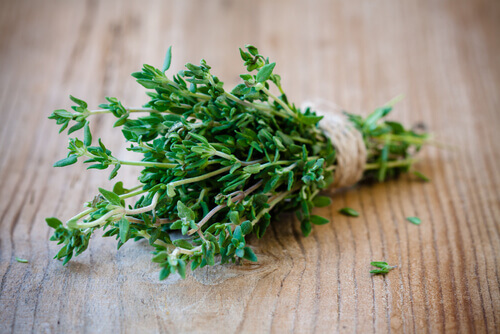Soothe a Cough with Thyme, Lemon, and Honey Tea


Reviewed and approved by the doctor José Gerardo Rosciano Paganelli
The arrival of winter means a weakened immune system, fewer antibodies, and more colds and coughing. Fortunately, you can soothe a cough with a natural remedy.
Sure, respiratory system issues aren’t usually serious. However, they do cause annoying and painful symptoms like congestion and just feeling bad and sick.
What happens is that a virus finds a home in your body and then attacks and inflames the tissue.
Then, symptoms tend to get worse over time. However, they only last a few days or a week, especially if treated correctly.
Fortunately, besides conventional medicine, there are natural remedies that can help you get back to normal sooner.
One of them is this tea made with thyme, lemon, and honey. It’s anti-inflammatory and an expectorant.
Next, we’ll tell you all that it can do for you. Additionally, we’ll show you how to make it at home by following just a few simple steps to soothe a cough.
Thyme, lemon, and honey tea for a cold or cough
This tea made with thyme, lemon, and honey is a natural remedy with antiviral properties that will help reduce the severity of your cold and cough.
These ingredients have anti-inflammatory properties, which help with irritation in your respiratory airways, helping get rid of phlegm and germs.
The antioxidants in it inhibit the negative effects of free radicals on your lungs, and because of this cleansing, it helps relieve congestion.
“Want to learn more? Habits that Can Make You Sick Without You Knowing It”
What thyme can do for you

- First, it stands out due to its high vitamin C and iron content, two nutrients that support your immune system, enhancing the response of antibodies to infectious agents.
- And, it contains polyphenols and substances like thymol, known for having the ability to relieve coughs and soothe airways.
- Additionally, it acts like an expectorant, reducing any phlegm build-up, which is key in relieving congestion.
- Also, it also provides your body with a substance called carvacrol, which lowers levels of germs and toxins.
What lemons can do for you
Lemons are one of the most highly recommended citrus fruits if you want to treat a respiratory problem or soothe a cough.
- High in vitamin A, C, and E, they are great for your immune system and keeping your defense up.
- The minerals in them improve your production of red blood cells, which is fundamental for proper secretion of antibodies.
- They are a source of fiber, which lowers your bad cholesterol (LDL) and helps with constipation and anxiety.
- Natural lemon oil naturally cleanses your airways and keep viruses, bacteria, and fungi from growing.
What honey can do for you
Honey is a medicinal product of nature that is used to support the respiratory system and immune system.
- Rich in antioxidants and natural sugars, it can help with coughs, fevers, and other symptoms of a cold.
- It acts directly on the virus or bacteria, keeping infections of the respiratory tract from worsening.
- It’s a natural expectorant that soothes your throat while removing excess phlegm.
- It contains nutrients that give it an anti-inflammatory effect, which reduces the irritation that coughing and sneezing can cause.
“Take a look at this article: Fight Colds with this Homemade Honey and Ginger Syrup”
How do I make this thyme, lemon, and honey tea?

Making this antiviral tea is very easy and only takes a few minutes and can be just what you need to soothe a cough.
It’s great for the wintertime or anytime you feel a cold or cough coming on.
Ingredients
- 1 cup of water (250 ml)
- 1 teaspoon of thyme (5 g)
- 2 tablespoons of lemon juice (20 ml)
- 1 tablespoon of organic honey (25 g)
Preparation
- Heat the water on high heat.
- Once it begins boiling, lower the heat and add the thyme.
- Let simmer for 5 minutes and then remove from heat.
- Let steep for 10 minutes and then strain.
- Add the lemon juice and honey, and stir until dissolved.
How to consume
- Have the tea 2 or 3 times a day to soothe a cough.
- Try to have it before bed in order to control your symptoms and help you get a good night’s sleep.
Are you congested? Is your throat raw from coughing? Make this natural tea and feel better sooner.
All cited sources were thoroughly reviewed by our team to ensure their quality, reliability, currency, and validity. The bibliography of this article was considered reliable and of academic or scientific accuracy.
- Font, Elisabet. “Etiología, diagnóstico, profilaxis y tratamiento del resfriado común.” Offarm 21.11 (2002): 72-80.
- María Esquinas, N., A. Hidalgo Arenas, and B. Nieto Moro. “Creencias de los pacientes acerca de las características, causas y cuidados del catarro común.” Medifam 11.1 (2001): 67-68.
- Sussman, O. “Resfriado común e influenza.” Acta de Otorrinolaringología y (2005).
This text is provided for informational purposes only and does not replace consultation with a professional. If in doubt, consult your specialist.








